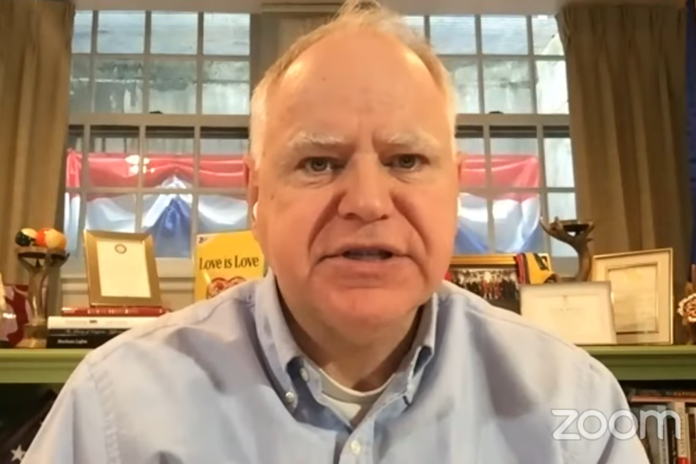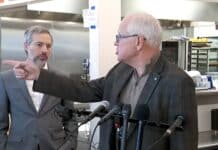
Gov. Tim Walz expressed his support for a bill that would give progressive organizations influence over the state’s collection of data on “crimes motivated by bias” and police training standards for responding to those crimes.
“Words matter. It, to me, is stunning that we would not hold hearings in the Minnesota Senate to debate this bill that simply does the obvious, that makes it a crime to discriminate against a neighbor for any reason of who they are or their origin or their religious preferences or you name it,” Walz said at a Tuesday press conference on the bill.
Sponsored by Rep. Frank Hornstein, DFL-Minneapolis, H.F. 1691 would expand the definition of “crimes motivated by bias” to include bias against a person because of their gender, gender identity or gender expression, and bias against a person because of their “actual or perceived” association with a protected group.
Rep. Matt Grossell, R-Clearbrook, offered an amendment to include police officers, judges and other law enforcement officials in the bill, but the proposal was rejected by the DFL-controlled House Public Safety Committee.
“In human rights law, in civil rights law, we have very specific protected classes based on their identity, not their profession,” Hornstein said of Grossell’s amendment, noting that there are already enhanced penalties for crimes against police officers.
Several progressive groups are backing the legislation and held a virtual press conference Tuesday to discuss the bill. These groups, calling themselves the “Communities Combating Hate” coalition, said the bill makes three changes to current law.
First, it closes a “loophole” in state law that bases whether property damage is considered “bias motivated” on the identity of the property owner.
“Many of us have seen racist and anti-Semitic graffiti painted on public schools. Under current law, due to these buildings not being owned by targeted groups, these incidents would not be recorded as part of a picture of hate in Minnesota,” said Carin Mrotz, executive director of Jewish Community Action.
Second, the bill “allows community organizations to create curriculum” for law enforcement training on hate crimes. The curriculum would require approval from the Peace Officer Standards and Training (POST) Board and the Department of Human Rights.
A final provision in the bill would allow “community organizations” to collect reports on bias-motivated crimes and submit this data to the Department of Human Rights for its official recordkeeping, according to Tuesday’s press conference.
A clear definition of “community organizations” wasn’t provided at the press conference or in the bill, but several progressive groups, such as CAIR-Minnesota, Gender Justice, OutFront Minnesota and others, are behind the push to adopt the legislation.
Minnesota currently collects data on “incidents of hate” only through law enforcement reports.
“We know some communities do not feel safe engaging with law enforcement and are therefore far less likely to report an incident, which means there are many stories going untold or unheard that never become part of a bigger picture of what’s happening in Minnesota,” Mrotz explained.
“Our bill opens a channel for community organizations to share the reports we take directly with the Department of Human Rights, which will enable leadership to develop an accurate representation of what communities are experiencing in Minnesota,” she added.
Jaylani Hussein, executive director of CAIR’s Minnesota chapter, slandered Alpha News at Tuesday’s press conference and said a hate crime is “not always clearly noticeable in the immediate action.”
“Hate is being fueled today by the likes of clickbait news sites like Alpha News and others, demonizing minorities and immigrant populations, as well as small hate groups who are oftentimes under the radar,” he said.
Lt. Gov. Peggy Flanagan also spoke at the press conference, saying the shootings last week in Atlanta, Ga., were a reminder that “when we talk about gun violence, we must also talk about racism and misogyny and economic security.”
The bill passed out of the House Public Safety Committee on a 10-8 party line vote.








